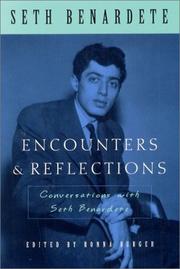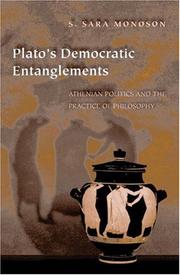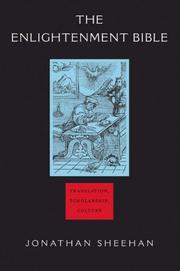| Listing 1 - 5 of 5 |
Sort by
|

ISBN: 128253825X 9786612538254 0226042774 9780226042770 0226042782 9780226042787 6612538252 Year: 2002 Publisher: Chicago : University of Chicago Press,
Abstract | Keywords | Export | Availability | Bookmark
 Loading...
Loading...Choose an application
- Reference Manager
- EndNote
- RefWorks (Direct export to RefWorks)
By turns wickedly funny and profoundly illuminating, Encounters and Reflections presents a captivating and unconventional portrait of the life and works of Seth Benardete. One of the leading scholars of ancient thought, Benardete here reflects on both the people he knew and the topics that fascinated him throughout his career in a series of candid, freewheeling conversations with Robert Berman, Ronna Burger, and Michael Davis. The first part of the book discloses vignettes about fellow students, colleagues, and acquaintances of Benardete's who later became major figures in the academic and intellectual life of twentieth-century America. We glimpse the student days of Allan Bloom, Stanley Rosen, George Steiner, and we discover the life of the mind as lived by well-known scholars such as David Grene, Jacob Klein, and Benardete's mentor Leo Strauss. We also encounter a number of other learned, devoted, and sometimes eccentric luminaries, including T.S. Eliot, James Baldwin, Werner Jaeger, John Davidson Beazley, and Willard Quine. In the book's second part, Benardete reflects on his own intellectual growth and on his ever-evolving understanding of the texts and ideas he spent a lifetime studying. Revisiting some of his recurrent themes-among them eros and the beautiful, the city and the law, and the gods and the human soul-Benardete shares his views on thinkers such as Plato, Homer, and Heidegger, as well as the relations between philosophy and science and between Christianity and ancient Roman thought. Engaging and informative, Encounters and Reflections brings Benardete's thought to life to enlighten and inspire a new generation of thinkers.
Classicists --- Classical philology --- Philosophy, Ancient --- Philosophy teachers --- College teachers --- Academicians --- Academics (Persons) --- College instructors --- College lecturers --- College professors --- College science teachers --- Lectors (Higher education) --- Lecturers, College --- Lecturers, University --- Professors --- Universities and colleges --- University academics --- University instructors --- University lecturers --- University professors --- University teachers --- Teachers --- Ancient philosophy --- Greek philosophy --- Philosophy, Greek --- Philosophy, Roman --- Roman philosophy --- Philology, Classical --- Classical antiquities --- Greek language --- Greek literature --- Greek philology --- Humanism --- Latin language --- Latin literature --- Latin philology --- Classical scholars --- Classics scholars --- Hellenists --- Latinists --- Philologists --- Scholars --- Study and teaching --- Faculty --- Benardete, Seth --- Benardete, S. G. --- Benardete, Seth G. --- Benardete, Seth Gabrielito --- seth benardete, classics, classical literature, philosophy, philosophical, unconventional, conversations, robert berman, ronna burger, michael davis, academics, 20th century, american culture, leo strauss, james baldwin, ts eliot, willard quine, eros, human soul, humanity, plato, homer, christianity, interviews, interactions, classists, martin heidegger, john davidson beazley, werner jaeger, allan bloom, stanley rosen.
Book
ISBN: 1282645048 9786612645044 1400835062 0691128561 0691163421 9780691163420 9781400835065 9781282645042 9780691128566 Year: 2010 Publisher: Princeton, NJ
Abstract | Keywords | Export | Availability | Bookmark
 Loading...
Loading...Choose an application
- Reference Manager
- EndNote
- RefWorks (Direct export to RefWorks)
In recent years, most political theorists have agreed that shame shouldn't play any role in democratic politics because it threatens the mutual respect necessary for participation and deliberation. But Christina Tarnopolsky argues that not every kind of shame hurts democracy. In fact, she makes a powerful case that there is a form of shame essential to any critical, moderate, and self-reflexive democratic practice. Through a careful study of Plato's Gorgias, Tarnopolsky shows that contemporary conceptions of shame are far too narrow. For Plato, three kinds of shame and shaming practices were possible in democracies, and only one of these is similar to the form condemned by contemporary thinkers. Following Plato, Tarnopolsky develops an account of a different kind of shame, which she calls "respectful shame." This practice involves the painful but beneficial shaming of one's fellow citizens as part of the ongoing process of collective deliberation. And, as Tarnopolsky argues, this type of shame is just as important to contemporary democracy as it was to its ancient form. Tarnopolsky also challenges the view that the Gorgias inaugurates the problematic oppositions between emotion and reason, and rhetoric and philosophy. Instead, she shows that, for Plato, rationality and emotion belong together, and she argues that political science and democratic theory are impoverished when they relegate the study of emotions such as shame to other disciplines.
Democracy - Philosophy. --- Democracy -- Philosophy. --- Plato. --- Plato. Gorgias. --- Shame - Political aspects. --- Shame -- Political aspects. --- Shame --- Democracy --- Philosophy --- Philosophy & Religion --- Political aspects --- Political aspects. --- Philosophy. --- Emotions --- Guilt --- Ad hominem. --- Allan Bloom. --- Ambiguity. --- Ambivalence. --- Anger. --- Aristotle. --- Athenian Democracy. --- Bernard Williams. --- Callicles. --- Catamite. --- Charmides (dialogue). --- Child abuse. --- Civility. --- Conflation. --- Controversy. --- Criticism. --- Critique. --- Crito. --- Deliberation. --- Demagogue. --- Dialectic. --- Dichotomy. --- Direction of fit. --- Disgust. --- Disposition. --- Distrust. --- Elitism. --- Embarrassment. --- False-consensus effect. --- Forensic rhetoric. --- Form of life (philosophy). --- Freedom of speech. --- Gorgias (dialogue). --- Gorgias. --- Grandiosity. --- Gregory Vlastos. --- Hannah Arendt. --- Hedonism. --- Hippias Major. --- Human Rights Watch. --- Humiliation. --- Ideology. --- Inference. --- Irony. --- Jon Elster. --- McGill University. --- Morality. --- Multitude. --- Myth. --- Nicomachean Ethics. --- Omnipotence. --- On the Soul. --- Ostracism. --- Pathos. --- Perversion. --- Phaedo. --- Phaedrus (dialogue). --- Phenomenon. --- Philosopher. --- Pity. --- Pleonexia. --- Political philosophy. --- Politics. --- Polus. --- Prejudice. --- Princeton University Press. --- Protagoras. --- Psychoanalysis. --- Psychotherapy. --- Public sphere. --- Pythagoreanism. --- Rationality. --- Reason. --- Reintegrative shaming. --- Republic (Plato). --- Result. --- Rhetoric. --- Self-criticism. --- Self-deception. --- Self-esteem. --- Self-image. --- Shame. --- Social stigma. --- Socratic (Community). --- Socratic method. --- Socratic. --- Sophism. --- Sophist. --- Suffering. --- Suggestion. --- Symposium (Plato). --- The Philosopher. --- Theory. --- Thought. --- Thrasymachus. --- Uncertainty. --- Vlastos. --- Vulnerability.

ISBN: 0691043663 0691158584 9786612767128 1400823749 1282767127 1400812720 9781400812721 9781282767126 9781400823741 9780691043661 1400805473 Year: 2000 Publisher: Princeton, N.J. Princeton University Press
Abstract | Keywords | Export | Availability | Bookmark
 Loading...
Loading...Choose an application
- Reference Manager
- EndNote
- RefWorks (Direct export to RefWorks)
In this book, Sara Monoson challenges the longstanding and widely held view that Plato is a virulent opponent of all things democratic. She does not, however, offer in its place the equally mistaken idea that he is somehow a partisan of democracy. Instead, she argues that we should attend more closely to Plato's suggestion that democracy is horrifying and exciting, and she seeks to explain why he found it morally and politically intriguing. Monoson focuses on Plato's engagement with democracy as he knew it: a cluster of cultural practices that reach into private and public life, as well as a set of governing institutions. She proposes that while Plato charts tensions between the claims of democratic legitimacy and philosophical truth, he also exhibits a striking attraction to four practices central to Athenian democratic politics: intense antityrantism, frank speaking, public funeral oratory, and theater-going. By juxtaposing detailed examination of these aspects of Athenian democracy with analysis of the figurative language, dramatic structure, and arguments of the dialogues, she shows that Plato systematically links democratic ideals and activities to philosophic labor. Monoson finds that Plato's political thought exposes intimate connections between Athenian democratic politics and the practice of philosophy. Situating Plato's political thought in the context of the Athenian democratic imaginary, Monoson develops a new, textured way of thinking of the relationship between Plato's thought and the politics of his city.
Democracy --- History --- Plato --- Views on democracy --- -Self-government --- Political science --- Equality --- Representative government and representation --- Republics --- -Aflāṭūn --- Aplaton --- Bolatu --- Platon, --- Platonas --- Platone --- Po-la-tʻu --- Pʻŭllatʻo --- Pʻŭllatʻon --- Pʻuratʻon --- Πλάτων --- אפלטון --- פלאטא --- פלאטאן --- פלאטו --- أفلاطون --- 柏拉圖 --- 플라톤 --- History. --- Views on democracy. --- Self-government --- Aflāṭūn --- Plato. --- Platon --- Platoon --- Платон --- プラトン --- Democracy - Greece - Athens - History --- Plato - Views on democracy --- Aeschylus. --- Against Timarchus. --- Allan Bloom. --- Allegory of the Cave. --- Allusion. --- Ancient Greece. --- Aristotle. --- Athenian Democracy. --- Bribery. --- Callicles. --- Cambridge University Press. --- Citizenship. --- Classical Athens. --- Constitution of the Athenians. --- Critias (dialogue). --- Critias. --- Criticism of democracy. --- Criticism. --- Critique. --- Deliberation. --- Democracy. --- Democratic ideals. --- Demosthenes. --- Ethics. --- Ethos. --- Euripides. --- Exclusion. --- Explanation. --- Fifth-century Athens. --- Funeral oration (ancient Greece). --- Glaucon. --- Gorgias (dialogue). --- Gorgias. --- Greatness. --- Greek tragedy. --- Harmodius and Aristogeiton (sculpture). --- Harmodius and Aristogeiton. --- Herodotus. --- Idealization. --- Ideology. --- Imagery. --- Institution. --- Isocrates. --- Isonomia. --- Josiah Ober. --- Literature. --- Martha Nussbaum. --- Masculinity. --- Menexenus (dialogue). --- Metaphor. --- Metic. --- Multitude. --- Narrative. --- Oligarchy. --- One Hundred Years of Homosexuality. --- Oxford University Press. --- Parrhesia. --- Pederasty in ancient Greece. --- Pericles' Funeral Oration. --- Pericles. --- Phaedrus (dialogue). --- Philosopher. --- Philosophy. --- Pierre Vidal-Naquet. --- Platonic Academy. --- Political dissent. --- Political philosophy. --- Political science. --- Politics. --- Princeton University Press. --- Protagoras. --- Reason. --- Republic (Plato). --- Rhetoric. --- SAGE Publications. --- Self-image. --- Sheldon Wolin. --- Slavery. --- Socratic dialogue. --- Socratic. --- Sophist. --- Sophistication. --- Suggestion. --- The Erotic. --- The Other Hand. --- The Philosopher. --- Theatre of Dionysus. --- Themistocles. --- Theory. --- Thomas Pangle. --- Thought. --- Thucydides. --- Tragedy. --- Tyrannicide. --- Tyrant. --- Voting. --- Wealth. --- Writing. --- Yale University Press.

ISBN: 9780691130699 0691130698 0691118876 1400847796 9781400847792 9780691118871 Year: 2013 Publisher: Princeton, NJ
Abstract | Keywords | Export | Availability | Bookmark
 Loading...
Loading...Choose an application
- Reference Manager
- EndNote
- RefWorks (Direct export to RefWorks)
How did the Bible survive the Enlightenment? In this book, Jonathan Sheehan shows how Protestant translators and scholars in the eighteenth century transformed the Bible from a book justified by theology to one justified by culture. In doing so, the Bible was made into the cornerstone of Western heritage and invested with meaning, authority, and significance even for a secular age. The Enlightenment Bible offers a new history of the Bible in the century of its greatest crisis and, in turn, a new vision of this century and its effects on religion. Although the Enlightenment has long symbolized the corrosive effects of modernity on religion, Sheehan shows how the Bible survived, and even thrived in this cradle of ostensible secularization. Indeed, in eighteenth-century Protestant Europe, biblical scholarship and translation became more vigorous and culturally significant than at any time since the Reformation. From across the theological spectrum, European scholars--especially German and English--exerted tremendous energies to rejuvenate the Bible, reinterpret its meaning, and reinvest it with new authority. Poets, pedagogues, philosophers, literary critics, philologists, and historians together built a post-theological Bible, a monument for a new religious era. These literati forged the Bible into a cultural text, transforming the theological core of the Judeo-Christian tradition. In the end, the Enlightenment gave the Bible the power to endure the corrosive effects of modernity, not as a theological text but as the foundation of Western culture.
Enlightenment.
---
Siècle des lumières
---
Bible.
---
History.
---
-Enlightenment.
---
Aufklärung
---
Eighteenth century
---
Philosophy, Modern
---
Rationalism
---
Bible
---
History
---
Enlightenment
---
#GGSB: Exegese
---
22.06 <09>
---
Bijbel: exegese--
Book
ISBN: 0691207720 9780691207728 9780691193854 0691193851 9780691207711 Year: 2021 Publisher: Princeton, NJ
Abstract | Keywords | Export | Availability | Bookmark
 Loading...
Loading...Choose an application
- Reference Manager
- EndNote
- RefWorks (Direct export to RefWorks)
"Not so long ago, conservative intellectuals such as William F. Buckley Jr. believed universities were worth fighting for. Today, conservatives seem more inclined to burn them down. In Let's Be Reasonable, conservative political theorist and professor Jonathan Marks finds in liberal education an antidote to this despair, arguing that the true purpose of college is to encourage people to be reasonable--and revealing why the health of our democracy is at stake. Drawing on the ideas of John Locke and other thinkers, Marks presents the case for why, now more than ever, conservatives must not give up on higher education. He recognizes that professors and administrators frequently adopt the language and priorities of the left, but he explains why conservative nightmare visions of liberal persecution and indoctrination bear little resemblance to what actually goes on in college classrooms. Marks examines why advocates for liberal education struggle to offer a coherent defense of themselves against their conservative critics, and demonstrates why such a defense must rest on the cultivation of reason and of pride in being reasonable. More than just a campus battlefield guide, Let's Be Reasonable recovers what is truly liberal about liberal education--the ability to reason for oneself and with others--and shows why the liberally educated person considers reason to be more than just a tool for scoring political points." -- from book jacket
Education, Humanistic. --- Education, Liberal --- Humanistic education --- Liberal arts education --- Liberal education --- Education --- Classical education --- Allan Bloom. --- BDS movement. --- Closing of the American Mind. --- Generation Z. --- Jeffrey Kopstein. --- John Locke. --- Mark Edmundson. --- Rousseau. --- Tocqueville. --- W.E.B. Du Bois. --- academic freedom. --- academic politics. --- anti-Israel movement. --- apartheid. --- campus left. --- campus politics. --- censorship. --- civil rights movement. --- conservatism. --- conservative professors. --- diversity. --- free speech. --- great books. --- humanities. --- liberal arts. --- liberalism. --- political philosophy. --- political theory and education. --- politics and education. --- racism. --- student activism. --- student protests. --- Education, Higher --- Education, Humanistic --- Philosophy. --- Aims and objectives --- Aims and objectives. --- United States. --- Political philosophy. Social philosophy --- Teaching --- ABŞ --- ABSh --- Ameerika Ühendriigid --- America (Republic) --- Amerika Birlăshmish Shtatlary --- Amerika Birlăşmi Ştatları --- Amerika Birlăşmiş Ştatları --- Amerika ka Kelenyalen Jamanaw --- Amerika Qūrama Shtattary --- Amerika Qŭshma Shtatlari --- Amerika Qushma Shtattary --- Amerika (Republic) --- Amerikai Egyesült Államok --- Amerikanʹ Veĭtʹsėndi͡avks Shtattnė --- Amerikări Pĕrleshu̇llĕ Shtatsem --- Amerikas Forenede Stater --- Amerikayi Miatsʻyal Nahangner --- Ameriketako Estatu Batuak --- Amirika Carékat --- AQSh --- Ar. ha-B. --- Arhab --- Artsot ha-Berit --- Artzois Ha'bris --- Bí-kok --- Ē.P.A. --- É.-U. --- EE.UU. --- Egyesült Államok --- ĒPA --- Estados Unidos --- Estados Unidos da América do Norte --- Estados Unidos de América --- Estaos Xuníos --- Estaos Xuníos d'América --- Estatos Unitos --- Estatos Unitos d'America --- Estats Units d'Amèrica --- Ètats-Unis d'Amèrica --- États-Unis d'Amérique --- ÉU --- Fareyniḳṭe Shṭaṭn --- Feriene Steaten --- Feriene Steaten fan Amearika --- Forente stater --- FS --- Hēnomenai Politeiai Amerikēs --- Hēnōmenes Politeies tēs Amerikēs --- Hiwsisayin Amerikayi Miatsʻeal Tērutʻiwnkʻ --- Istadus Unidus --- Jungtinės Amerikos valstybės --- Mei guo --- Mei-kuo --- Meiguo --- Mî-koet --- Miatsʻyal Nahangner --- Miguk --- Na Stàitean Aonaichte --- NSA --- S.U.A. --- SAD --- Saharat ʻAmērikā --- SASht --- Severo-Amerikanskie Shtaty --- Severo-Amerikanskie Soedinennye Shtaty --- Si͡evero-Amerikanskīe Soedinennye Shtaty --- Sjedinjene Američke Države --- Soedinennye Shtaty Ameriki --- Soedinennye Shtaty Severnoĭ Ameriki --- Soedinennye Shtaty Si͡evernoĭ Ameriki --- Spojené obce severoamerické --- Spojené staty americké --- SShA --- Stadoù-Unanet Amerika --- Stáit Aontaithe Mheiriceá --- Stany Zjednoczone --- Stati Uniti --- Stati Uniti d'America --- Stâts Unîts --- Stâts Unîts di Americhe --- Steatyn Unnaneysit --- Steatyn Unnaneysit America --- SUA --- Sŭedineni amerikanski shtati --- Sŭedinenite shtati --- Tetã peteĩ reko Amérikagua --- U.S. --- U.S.A. --- United States of America --- Unol Daleithiau --- Unol Daleithiau America --- Unuiĝintaj Ŝtatoj de Ameriko --- US --- USA --- Usono --- Vaeinigte Staatn --- Vaeinigte Staatn vo Amerika --- Vereinigte Staaten --- Vereinigte Staaten von Amerika --- Verenigde State van Amerika --- Verenigde Staten --- VS --- VSA --- Wááshindoon Bikéyah Ałhidadiidzooígíí --- Wilāyāt al-Muttaḥidah --- Wilāyāt al-Muttaḥidah al-Amirīkīyah --- Wilāyāt al-Muttaḥidah al-Amrīkīyah --- Yhdysvallat --- Yunaeted Stet --- Yunaeted Stet blong Amerika --- ZDA --- Združene države Amerike --- Zʹi͡ednani Derz͡havy Ameryky --- Zjadnośone staty Ameriki --- Zluchanyi͡a Shtaty Ameryki --- Zlucheni Derz͡havy --- ZSA
| Listing 1 - 5 of 5 |
Sort by
|

 Search
Search Feedback
Feedback About UniCat
About UniCat  Help
Help News
News